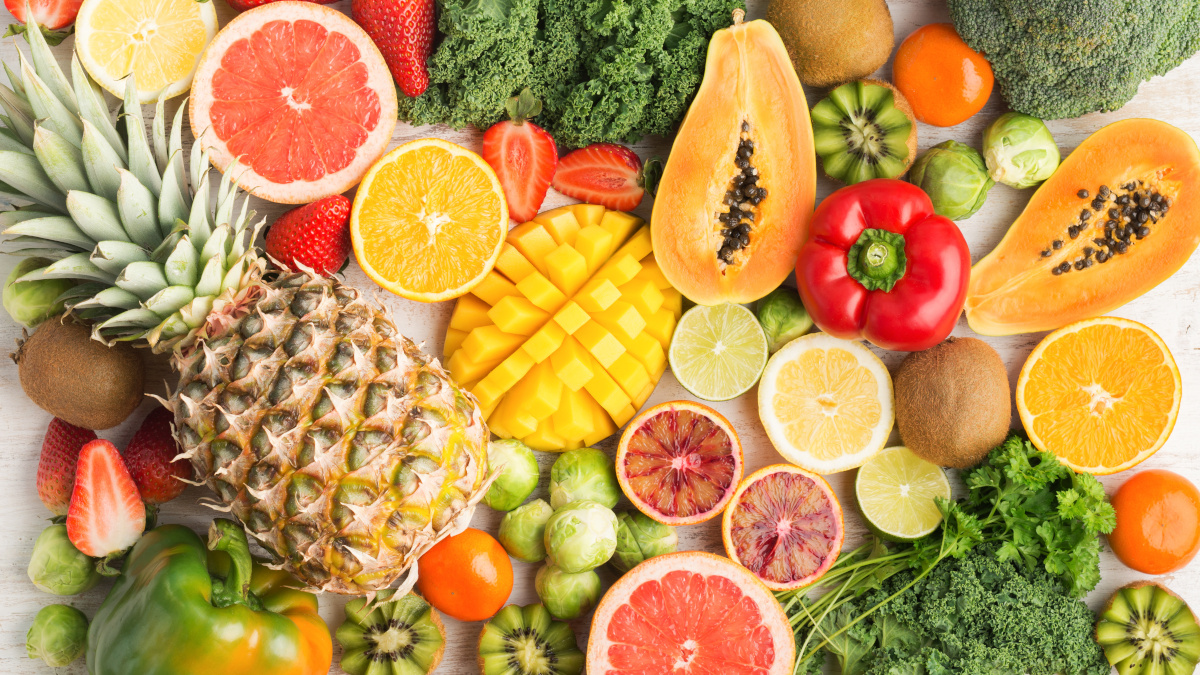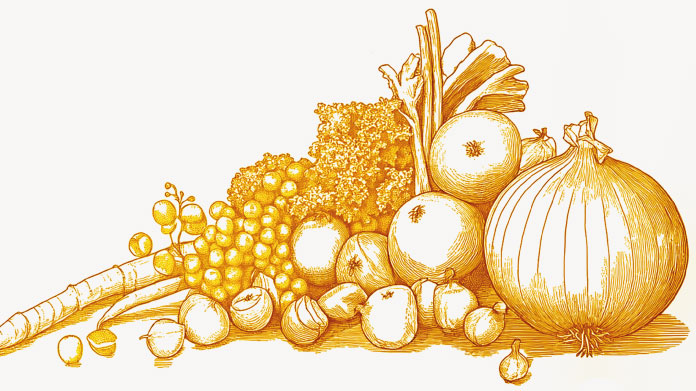The 5 best vitamins for the immune system
The European Food Safety Authority (EFSA) has compiled a list of vitamins that support normal immune system function. Discover these 5 unquestionably effective vitamins, and the foods that contain them.

Vitamin A
Vitamin A is a fat-soluble vitamin which plays a key role in the process of cell specialisation. Important for the production of certain eye pigments, it helps maintain normal vision. It also supports the health of the skin and mucous membranes.
Vitamin A and immunity
Vitamin A is also known for its role in regulating cellular immune responses and humoral immune processes (1). It is thus recognised by the EFSA as directly supporting the normal function of the immune system (2).
Which foods are rich in vitamin A?
Vitamin A or retinol is found in animal-source foods, such as cod liver oil, cooked chicken livers, butter, crème fraîche, eggs ... But we also get vitamin A from plant-source foods rich in beta-carotene (a compound which is converted into retinol in the body): cooked sweet potatoes, carrots, pumpkin, apricots... You also have the option of taking a natural carotenoid complex with a high beta-carotene content (such as Carottol™).
Vitamin C
The famous vitamin C, also known as L-ascorbic acid, is a water-soluble vitamin . It too is involved in numerous physiological reactions. It supports normal formation of the collagen necessary for healthy blood vessels, cartilage, skin, bones and teeth. It also plays a role in ensuring normal nervous system function and energy metabolism.
Vitamin C and immunity
Vitamin C plays a key role in our immune defences, too. In particular, it appears to both support the function of the epithelial barrier and help scavenge oxidants and eliminate spent neutrophils. Conversely, deficiency in vitamin C is associated with a decrease in immunity (3). Thus according to the EFSA, ascorbic acid supports the normal function of the immune system function (4).
Which foods are rich in vitamin C ?
To ensure a good intake of vitamin C, you need to eat plenty of fruits and vegetables such as guava, kiwi fruit, oranges, red peppers and broccoli... You can also take a vitamin C supplement, preferably liposomal vitamin C, the form best absorbed by the body (for example, the product Liposomal Vitamin C).
Vitamin B12
One of the 8-strong group of B vitamins,vitamin B12, or cobalamin, is also a water-soluble vitamin. Essential for cell renewal, it plays a role in the formation of red blood cells, the normal metabolism of homocysteine and in helping to reduce fatigue.
Vitamin B12 and immunity
B12 also appears to act as an immunomodulator for cellular immunity, with a particular effect on lymphocyte levels (5). The EFSA thus recognises this vitamin as contributing to normal immune system function (6).
Which foods are rich in vitamin B12?
Vitamin B12 is found mainly in animal-source foods: offal, seafood, meat, fish... That’s why vegans and vegetarians in particular (but not exclusively!), are advised to supplement with B12. The most active form of vitamin B12 is called methylcobalamin (try, for example, the product Methylcobalamine).
Vitamin D
Another star nutrient, vitamin D or calciferol is a fat-soluble vitamin. As well as being present in the diet, it is produced by the body from cholesterol or ergocholesterol, when the skin is exposed to the sun’s rays. Vitamin D plays a role in maintaining normal muscle function and healthy teeth. It also helps ensure normal development of bones in children.
Vitamin D and immunity
Vitamin D also works at another level: it plays a role in modulating innate and adaptive immune responses, and stimulating the defensive capacity of mucous membranes (7). It is therefore classified by the EFSA as one of the compounds that support normal immune system function (8).
Which foods are rich in vitamin D?
Oils and oily fish are the foods that contain most vitamin D. They include salmon, mackerel, sardines, tuna, cod liver oil, olive oil … Dark chocolate and cooked button mushrooms are also good sources. To ensure an adequate vitamin D intake, make sure you also expose your skin to the sun on a regular basis - even if you work indoors and the weather sometimes makes this difficult. In terms of supplements, it’s best to choose a form with high bioavailability like vitamin D3, (for example Vitamin D3 5000 IU).
Vitamin B9, or folic acid
What exactly is it?
Vitamin B9, also known as folic acid or folate, is a water-soluble vitamin which plays a key role in many of the body’s functions, including normal production of amino acids and normal psychological function. It also contributes to maternal tissue growth during pregnancy.
Folic acid and immunity
Involved in the process of cell division, folic acid also influences immunity. Folate deficiency has a direct effect on cell-mediated immunity (11). According to the EFSA, therefore, this is another vitamin that supports normal immune system function (12).
Which foods are rich in vitamin B9?
Folic acid is found in liver, egg yolk, nutritional yeast, nuts (walnuts, hazelnuts, almonds...), green leafy vegetables, (spinach, salad ...), etc. You can also take a folate supplement (such as SuperFolate, voted ‘Product of the Year’ at the 2016 NutraIngredients Awards).
To obtain the benefits of the majority of these vitamins from a single supplement, you may prefer to take a multivitamin product. We’d mention in particular the well-known multivitamins Daily 3® (taken 3 times a day) and Daily 1® (taken just once a day). Both contain vitamins A, B6, B12, C and D, as well as minerals that also support normal function of the immune system.
References
- Huang Z, Liu Y, Qi G, Brand D, Zheng SG. Role of Vitamin A in the Immune System. J Clin Med. 2018;7(9):258. Published 2018 Sep 6. doi:10.3390/jcm7090258
- https://www.efsa.europa.eu/fr/efsajournal/pub/4028
- Carr AC, Maggini S. Vitamin C and Immune Function. Nutrients. 2017;9(11):1211. Published 2017 Nov 3. doi:10.3390/nu9111211
- https://www.efsa.europa.eu/fr/efsajournal/pub/1815
- Tamura J, Kubota K, Murakami H, Sawamura M, Matsushima T, Tamura T, Saitoh T, Kurabayshi H, Naruse T. Immunomodulation by vitamin B12: augmentation of CD8+ T lymphocytes and natural killer (NK) cell activity in vitamin B12-deficient patients by methyl-B12 treatment. Clin Exp Immunol. 1999 Apr;116(1):28-32. doi: 10.1046/j.1365-2249.1999.00870.x. PMID: 10209501; PMCID: PMC1905232.
- https://www.efsa.europa.eu/fr/efsajournal/pub/1223
- Aranow C. Vitamin D and the immune system. J Investig Med. 2011;59(6):881-886. doi:10.2310/JIM.0b013e31821b8755
- https://www.efsa.europa.eu/en/efsajournal/pub/1468
- Rall LC, Meydani SN. Vitamin B6 and immune competence. Nutr Rev. 1993 Aug;51(8):217-25. doi: 10.1111/j.1753-4887.1993.tb03109.x. PMID: 8302491.
- https://www.efsa.europa.eu/en/efsajournal/pub/1759
- Dhur A, Galan P, Hercberg S. Folate status and the immune system. Prog Food Nutr Sci. 1991;15(1-2):43-60. PMID: 1887065.
- https://www.efsa.europa.eu/en/efsajournal/pub/3893
Keywords
3 Days
My skin is clearing up nicely!
Pretty good for my skin so far.
Christian
6 Days
The new packaging is excellent
The new packaging is excellent - finally! No more squashed boxes and torn envelopes.
GORAN
6 Days
Great Product
Great Product
Larry Garrett
11 Days
Quick shipping
Quick shipping; good price. No issues!
Mary McCarty
12 Days
Thr product is very good and is helping…
Thr product is very good and is helping me on my health. Then is always on time
LUGO Luz
15 Days
Buying was fine
Buying was fine. I had problems with the website not recognizing my login info, and had to call to get it fixed. Other than that, everything was good.
David S. Clark
15 Days
Your super maca and super ginseng are…phenomenal
Your super maca and super ginseng are phenomenal supplements that compliment each other when taking them together. Fantastic feeling of well-being and lots of mid day energy without the crash.
Keith Mason
18 Days
I have had amazing results with every…
I have had amazing results with every supplement I've purchased. I am extremely satisfied with this company
kirstin Torres
18 Days
Fine products
Fine products . They are on the leading edge of online supplements. The only issue -so far-is they sometime run out of subscription items.
Jason Argos
21 Days
The ordering process is very user…
The ordering process is very user friendly and the products always come in a timely manner.
CARTER Rhonda
22 Days
The price for Dr
The price for Dr. Pero's AC-11 is reasonable and in line with his views. (my former colleague). Keep it pure.
CAMPBELL Clayton
24 Days
Right on every time.
Right on every time.
Arthur Nicholas
27 Days
They are cheaper than everyone else and…
They are cheaper than everyone else and the shipping was fast. Great company.
Patricia Adams
34 Days
Availability of quality health…
Availability of quality health supplements and it's wide variety is impressive. Ordering is seamless and shipping even during the holidays is well streamlined.
Mohamad Hussein
48 Days
A Product worth waiting for when not…
A Product worth waiting for when not available and then arriving as a surprise!
DOMINIC




